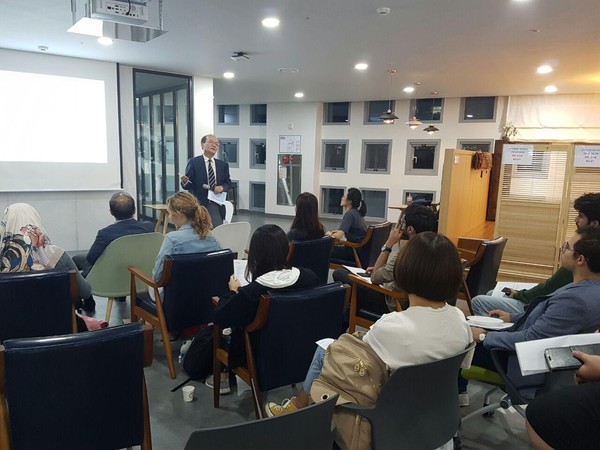Diplomatic Talks (D-Talks), one of the Ministry of Foreign Affairs’ diplomatic projects, was launched in 2016 to promote South Korea’s foreign policies to international students throughout the country. The KAIST Herald had the chance to interview Vice-Chairman Dong Hui Lee from the Korean Council on Foreign Relations, who gave a talk titled “Transformation of the International Order & the Korean Diplomacy” in the Academic Cultural Complex (E9) on September 26, together with Ms. Yoon Jin Im from the public diplomacy division of the Ministry of Foreign Affairs.
Could you elaborate more on the line of work of the Ministry of Foreign Affairs, as well as the Council on Foreign Relations and your role as its Vice Chairman?
Lee: When I was a member of the Korean National Diplomatic Academy, I spent most of my time on policy research and training of diplomatic forces. Now, in the Korean Council on Foreign Relations, we are trying to be research leaders on foreign policies and publish papers so people can understand Korean foreign policies better. I am in charge of those developments.
The diplomatic talks are among the ministry’s many other pursuits that aim to strengthen international awareness of South Korea. How do you think is this helpful towards your goal?
Im: D-Talks first originated as a means to promote something other than popular Korean cultural assets. Since popular culture is eye-catching, it’s easier to attract audiences and there are lots of programs oriented towards that. But the less known aspects, such as the [Korean] language and history, need to be promoted to the world. These can be less appealing for audiences compared to the popular cultural aspects, so we developed this kind of program especially targeting international students and residents in Korea.

Along that line, is there any particular reason for KAIST being among your target audiences for this talk?
Im: KAIST students are a unique group of interest for us. Even though KAIST students don’t specialize in diplomatic issues, we are sure [that] they can give us a different and innovative perspective on how to approach and resolve the global issues we are facing today.
You talked a lot about the unification of North and South Korea. How would the involvement of other nations affect the peace talks?
Lee: I think foreign intervention is unavoidable in the process of unification. Therefore, one of the most important missions of Korean foreign policies is to use foreign power intervention as helping hands for the unification. But at the moment, the process is challenging, ever-changing, and very fluid, so we have to lead by diplomatic engagement in a constructive and peaceful way.
How do you intend to widen future opportunities for the international community in and out of South Korea through your line of work? Are there any other projects you intend to launch in the future?
Im: There are five divisions in our bureau. [My] division is in charge of public diplomacy and cultural affairs. There are already a lot of programs targeting the growing international audience but we are still working to promote our culture, heritage, language, history, and a lot of diplomatic issues.
Lee: In addition to our normal work, we have opened a number of cultural museums with the help of former ambassadors who are members of our institute. We have built different museums like the African museum in Yeongwol and the Latin American museum in Seoul.
Since KAIST is a science and technology institute, most students don’t have a deep understanding of international diplomatic relations. Is there any advice you can give us and our readers so that we can better understand international relations?
Lee: The Korean National Diplomatic Academy and the Korean Council on Foreign Relations hold workshops during winter and summer vacations so that interested students can get the chance to better understand Korean diplomacy. Since these programs are given in both English and Korean, international students are starting to participate. I advise KAIST students to participate in these programs as well.

